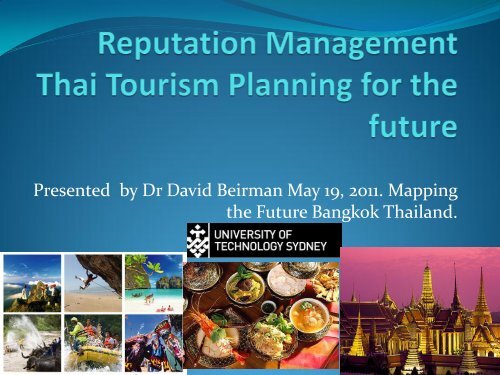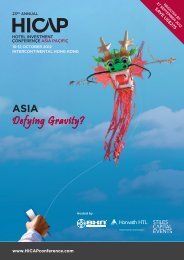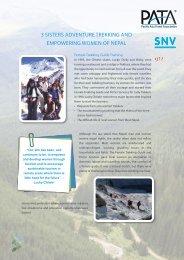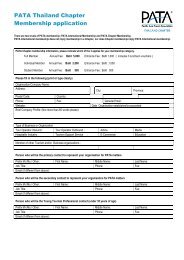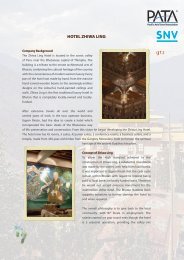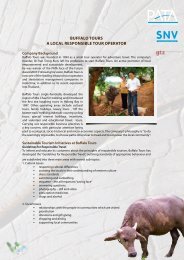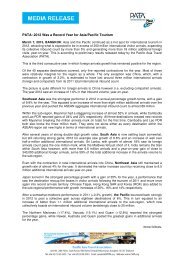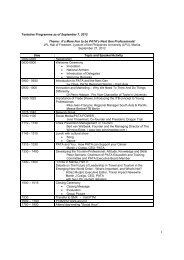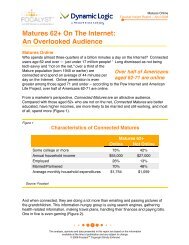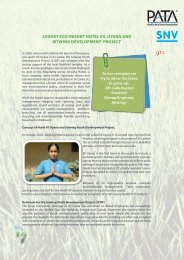Reputation Management Thai Tourism
Reputation Management Thai Tourism
Reputation Management Thai Tourism
Create successful ePaper yourself
Turn your PDF publications into a flip-book with our unique Google optimized e-Paper software.
Presented by Dr David Beirman May 19, 2011. Mapping<br />
the Future Bangkok <strong>Thai</strong>land.
Theme 1. Defining <strong>Reputation</strong> and<br />
perception in a <strong>Tourism</strong> Context<br />
• A component of social identity. Socially based.<br />
• <strong>Reputation</strong> is defined by significant others.<br />
• A fundamental instrument of social order.<br />
• In tourism, your market will determine both your<br />
perceptual image in the market and reputation (which<br />
in most instances means your standing)<br />
• Critical to reputation management is the ability to<br />
understand how significant stakeholders and<br />
prospective customers regard you in relation to your<br />
competitors.<br />
• Consistent Delivery on promises and claims.
<strong>Thai</strong>land’s <strong>Tourism</strong> Image as the <strong>Thai</strong> <strong>Tourism</strong><br />
industry and TAT would like to see it
2011
Theme 1. The Importance of Perception in<br />
Defining Business and Destination <strong>Reputation</strong><br />
• Perception and reputation is<br />
frequently more influential<br />
than the facts. Global Examples:<br />
• SARS in 2003 and Swine Flu 2009/11.<br />
• Political unrest in Egypt 2011.<br />
• The impact of earthquake, tsunami &<br />
• Nuclear fallout following the 2011 tsunami on<br />
destination Japan.<br />
• Unrest in the Middle East and its impact on<br />
tourism<br />
• The current economic “recession”.<br />
• Depicting a modest tourism downturn<br />
as a crisis.<br />
• “If it bleeds it leads” Tabloid News editors.
Key Concepts in Perception Analysis
Governors of <strong>Tourism</strong> Perception<br />
• News media in all forms.<br />
• Web and blog sites.<br />
• Lifestyle and travel Media incl.<br />
guidebooks.<br />
• Trade press.<br />
• Government travel advisories.<br />
• Cruise ship operators<br />
• Airlines.<br />
• Word of mouth and family opinions.<br />
• Major tour wholesalers.<br />
• Travel agency chains.
Key Stakeholders in Shaping of<br />
<strong>Thai</strong>land’s <strong>Tourism</strong> reputation<br />
• Airlines servicing <strong>Thai</strong>land.<br />
• Foreign Tour Operators which include <strong>Thai</strong> product.<br />
• Travel agents in key source market countries<br />
• Internet booking sites.<br />
• Travel Insurance providers in source markets.<br />
• Foreign Diplomatic legations in <strong>Thai</strong>land (travel<br />
advisories)<br />
• Media both news and tourism orientated publications,<br />
Electronic media, travel editors and journalists.<br />
• Regional <strong>Tourism</strong> Associations including PATA,<br />
ASEAN <strong>Tourism</strong> and APEC
Theme 2. Understanding What<br />
makes a Destination Competitive<br />
• J Brent Ritchie and Geoffrey Crouch in their seminal<br />
work, The Competitive Destination (2003) CABI Publishing<br />
UK/USA provide extensive coverage of the qualities<br />
which make for a competitive destination and by<br />
inference a destination which will enjoy a good<br />
reputation.
The DCI Model (Destination Competitive<br />
Index). Key to ongoing <strong>Reputation</strong><br />
Measurement<br />
Ritchie and Crouch (2003)<br />
DCI<br />
Index<br />
EP VS S MA<br />
Core Indicator<br />
Criteria
The DCI Model<br />
• Indicator 1: Economic Performance<br />
• Criteria:<br />
• 24 out of 163 total index criteria<br />
• 20 quantitative and 4 qualitative criteria<br />
• Some Criteria Examples:<br />
• Total visitor expenditures (secondary data)<br />
• Ratio of travel/tourism employee compensation to overall employee<br />
compensation (secondary data)<br />
• Ease of starting a tourism-related business (expert opinion)<br />
• Travel and tourism GDP/overall GDP (secondary data)
The DCI Model<br />
• Indicator 2: Sustainability<br />
• Criteria:<br />
• 60 out of 163 total index criteria<br />
• 7 quantitative and 53 qualitative criteria<br />
• Some Criteria Examples:<br />
• Preservation of natural capital (expert opinion)<br />
• Maintenance of ecological integrity (expert opinion)<br />
• Resident access to tourism infrastructure (resident survey)<br />
• Level of political support in facilitating tourism efforts<br />
(expert opinion)<br />
• Taxes generated from tourism expenditures (secondary data)<br />
• Visitor perception of destination having reached its tourism carrying<br />
capacity (visitor survey)
The DCI Model<br />
• Indicator 3: Visitor Satisfaction<br />
• Criteria:<br />
• 32 out of 163 total index criteria<br />
• 2 quantitative and 30 qualitative criteria<br />
• Some Criteria Examples:<br />
• Perceived richness of destination culture and history<br />
(visitor survey)<br />
• Satisfaction with overall destination quality of service<br />
(visitor survey)<br />
• Level of repeat visitation (secondary data)<br />
• Perception of resident hospitality (visitor survey)<br />
• Quality of the destination experience (visitor survey)
The DCI Model<br />
• Indicator 4: <strong>Management</strong> Action<br />
• Criteria:<br />
• 47 out of 163 total index criteria<br />
• 10 quantitative and 37 qualitative criteria<br />
• Some Criteria Examples:<br />
• Satisfaction with destination management (DM) action in dealing with<br />
competitive pressures<br />
(expert opinion)<br />
• Quality of involvement in human resource development programming<br />
and support<br />
(expert opinion)<br />
• Satisfaction with destination materials to help with trip planning (visitor<br />
survey)<br />
• Number of quality special events (secondary data)<br />
• Average visa fees per visitor (secondary data)
Steps to Destination success<br />
Implementation and results<br />
Goal congruence<br />
Competitor congruence<br />
Between enemies and allies<br />
Market congruence<br />
Categories, Nature and size of demand, Seasonality<br />
Ability to mobilise , train and deploy resources<br />
Factor endowments including natural resources,<br />
knowledge, capital and<br />
infrastructure
Theme 3.Working With The Media both<br />
Trade and Consumer to Build or Restore<br />
Business or Destination <strong>Reputation</strong>.<br />
• 1. Business to Business Media is a valuable ally if<br />
you treat it with respect and not just as a mouthpiece.<br />
Paying for positive advertising does not guarantee your<br />
destination or business positive editorial.<br />
• 2 Business to consumer media involves overcoming<br />
inate skepticism. You need to earn trust and support<br />
not try to either buy it or assume it. A professional<br />
journalist has a highly tuned bullshit antennae.
What Makes News According to<br />
Rupert Murdoch ? Interview June 20, 1987<br />
• Crisis<br />
• Conflict<br />
• Crime<br />
• Corruption<br />
• Catharthis<br />
• Conquest<br />
• Cataclysm<br />
• Scandal<br />
• Rescue<br />
• Triumph over adversity<br />
• Sporting Triumph
COMMON ASSUMPTIONS TO<br />
OVERCOME<br />
• The media is only interested in bad news.<br />
• The media is an adversary.<br />
• The media is not interested in covering<br />
solutions and recovery stories.<br />
• The media exaggerates problems.
<strong>Tourism</strong> in the Media<br />
• PRINT<br />
• Daily newspapers<br />
• Local, weeklies<br />
• Travel Specific<br />
magazines<br />
• Lifestyle magazines.<br />
• Billboards and posters<br />
ELECTRONIC<br />
• Websites<br />
• E publications<br />
• Blogs<br />
• Social networks<br />
Facebook & Twitter<br />
• TV Travel and Lifestyle<br />
shows (Getaway)<br />
• TV and radio news.<br />
• Radio<br />
• AV ads and displays.
Correcting Potentially Negative<br />
Assumptions<br />
• Many in the media want to support tourism as<br />
tourism advertising supports the media.<br />
• The media will publish or broadcast your side<br />
of the story if you are prepared to give it.<br />
• Well presented good news is as marketable as<br />
bad news.<br />
• The media can be an ally if its treated<br />
accordingly.<br />
• Travel writers and travel trade press have<br />
natural affinity towards the promotion of<br />
tourism.
How can we best work with the Media<br />
to get our story across ?<br />
• Develop and nurture contacts. BUILD TRUST.<br />
• Ensure there are an active media spokespeople for all<br />
key source markets who are fluent and articulate in<br />
the relevant language.<br />
• Ensure that person is readily contactable 24/7/365.<br />
• Ensure there is a coherent, consistent and credible<br />
media line on all tourism matters, especially crisis<br />
related matters.<br />
• Prepare factual answers to questions.<br />
• Ensure the organization understands and is<br />
consistently keeping to the organization’s policy line.<br />
• TIMING YOUR MESSAGE IS CRITICAL
The Core Elements of <strong>Reputation</strong><br />
<strong>Management</strong> For Destinations and<br />
<strong>Tourism</strong> Companies<br />
• HONESTY<br />
• CONSISTENCY<br />
• RELIABILITY<br />
• TRANPARENCY<br />
• CLEAR EVIDENCE TO BACK CLAIMS<br />
• SUPPORT OF STAKEHOLDERS<br />
• TESTIMONIALS FROM RESPECTED –PEOPLE<br />
FROM KEY SOURCE MARKETS
The Ingredients of an Effective <strong>Tourism</strong><br />
Recovery Media Campaign<br />
• Consumer and trade media targeted simultaneously.<br />
• Advertisements alone do not make a media campaign.<br />
A good media campaign has to be news and articles<br />
and eyewitness accounts from credible source to the<br />
target audience..<br />
• An effective media campaign is proactive.<br />
• A media campaign has to be appealing and relevant to<br />
its target audience.<br />
• The campaign has to be multi-media in scope.
The Essential Tools of Good<br />
Media Relations<br />
• A readily contactable media spokeperson.<br />
• An up to date an accurate web site.<br />
• Ready access to the facts.<br />
• Make their job easy by providing well<br />
prepared media releases and credible contacts<br />
for interviews.<br />
• Enable the media to see the situation first<br />
hand.<br />
• Honesty.
Correcting Negative Reports<br />
• Attack the content, not the journalist.<br />
• Ensure your facts are correct and verifiable.<br />
• Offer the reporter the opportunity to see<br />
for him/herself.<br />
• Quote from or provide access to credible<br />
sources who can verify your side of the story.
Set the News Agenda<br />
• Responsive PR places you in the defensive.<br />
• Where possible initiate positive coverage.<br />
• Spread the news of positive developments.<br />
• On identifying supportive reporters offer<br />
exclusives or preferential notice of a breaking<br />
story. Journalists love exclusives.
WEB SITE INCLUSIONS<br />
• Security advice for intending visitors. South Africa has<br />
used this strategy with great success<br />
• Anticipate negative perceptions and address them<br />
• Hot tips for a safe and enjoyable visit.<br />
• Unique experiences in <strong>Thai</strong>land. A welcome from<br />
famous Citizens.<br />
• Testimonials from celebrity visitors relevant to the<br />
source market.<br />
• Thematic <strong>Tourism</strong>.
Targeting the Media for New<br />
<strong>Tourism</strong> initiatives<br />
• Pick a niche market with potential for growth.<br />
• Lifestyle TV programs have global audiences.<br />
• Choose the socio-economic group you wish to target.<br />
• Travmedia service specialises in articles for travel journalists<br />
globally.<br />
• Tourist organisations should be cautious in offering<br />
assistance to current affairs programs<br />
• Hosting a “Good Morning America/ Australia/ New Zealand”<br />
or similar program in your source market country is viable<br />
and gives excellent coverage for several days.<br />
• The 2010-11 Oprah in Australia Campaign has proven to be an<br />
effective marketing campaign for <strong>Tourism</strong> Australia.
Which Country’s <strong>Tourism</strong> Industry is getting<br />
media management Right ?<br />
• South Africa:<br />
• Excellent leverage from 2010 World Cup.<br />
• Promotes a diversity of attractive tourism images.<br />
• Has positioned a high national crime rate from a<br />
potential crisis to an avoidable hazard.<br />
• Is proactive in engagement of consumer and trade<br />
media<br />
• Invites carefully targeted travel professionals and<br />
media for familiarization trips.<br />
• Excellent inter-sectoral relations between SATOUR<br />
and other South African tourism stakeholders.
Theme 4. Travel Advisories and<br />
Destination <strong>Reputation</strong>.<br />
• Understanding the basics of Diplomacy is vital for<br />
destination tourism professionals.<br />
• Demanding a country’s government tone down a<br />
travel advisory because you don’t like it never<br />
works because you are calling on a government to<br />
publicly lose face with its citizens.<br />
• Changing negative travel advisories involves a<br />
negotiation process in which you need the<br />
support of advocates in the source market.<br />
• The Australian model which follows will be<br />
helpful.
Travel Advisories Become an<br />
Issue of Diplomatic Conflict<br />
• Following the Bali Bombing of 12 October<br />
2002 Many Western governments issued<br />
negative travel advisories applying to<br />
Indonesia, and other SE Asian countries<br />
including Singapore, Malaysia Philippines and<br />
<strong>Thai</strong>land.<br />
• Fears of Al Q’aida related terrorism in many<br />
parts of SE Asia.
DFAT’s Approach to Advisories Post<br />
September 11 and Bali Bombings 2002<br />
• Primary concern the protection of Australian<br />
citizens abroad.<br />
• Political concerns that media judged “failure”<br />
to predict Bali required a cautious approach.<br />
• Heightened review of travel advisories<br />
and procedures.<br />
• Australian advisories should never be<br />
influenced by overt foreign pressure.
The Problems of Resolving<br />
Disputes through conflict<br />
• Australia and other Western governments<br />
can’t be seen to lose face by being perceived to<br />
change travel advisories in the face of foreign<br />
diplomatic pressure tactics.<br />
• Strident approach to Western advisories by SE<br />
Asian and SW Pacific nations is a barrier to<br />
review of advisories rather than a facilitator.<br />
• <strong>Thai</strong> <strong>Tourism</strong> Officials should build up<br />
contacts with the diplomatic legations of all<br />
key source market countries.
The Australian Travel Industry<br />
Developed a Role in Advisories<br />
• After 2002 the Australian Travel industry was<br />
increasingly critical of travel advisories and<br />
their formulation.<br />
• Travel industry sought a say.<br />
• Governments suspicious of travel industry<br />
motives. Profit before safety. INCORRECT<br />
• PATA, UN World <strong>Tourism</strong> Organization and<br />
tourism industry leaders sought a more active<br />
role in influencing travel advisories from all<br />
tourism generating countries.
The Australian Charter for Safe Travel Model for a<br />
Cooperative Approach between <strong>Tourism</strong> Industry and<br />
Government<br />
• Jan 2003 ANTOR sets up meeting between<br />
DFAT and travel industry leaders.<br />
• AFTA’s Mike Hatton establishes a committee<br />
of Australian Travel Industry leaders to<br />
negotiate with DFAT an agreement under the<br />
banner of the “Charter for Safe Travel”<br />
• The government seeks industry dissemination<br />
of travel advisories.<br />
• The Industry seeks a say in their content.
Charter for Safe Travel Signed in Sydney<br />
June 11, 2003.<br />
• Industry agrees to disseminate advisories.<br />
• Australian Government agrees to enhance<br />
consultation with industry through the<br />
Smartraveller Advisory Group which involves<br />
representatives from all key outbound travel<br />
companies and associations. Regualar<br />
meetings with DFAT<br />
• DFAT makes itself available to discuss<br />
advisories with travel agents through travel<br />
industry seminars and consumer travel expos.
An International Example of the<br />
Cooperative <strong>Tourism</strong> Approach to Travel<br />
Advisories- Kenya 2003-4<br />
• In April 2003 UK, USA and Germany imposed negative<br />
travel advisories on Kenya based on a perceived threat<br />
of terrorist attack.<br />
• May 2003 Kenyan <strong>Tourism</strong> leaders met with diplomats<br />
in closed meeting to negotiate what measures were<br />
required to overcome the advisories.<br />
• By July 2003 UK and USA lifted negative advisories<br />
based on Kenyan actions. US and Australia took much<br />
longer.<br />
• By adopting consultation rather than confrontation,<br />
Kenya’s tourism industry recovered with one year.
Global Approaches to Travel<br />
Advisories<br />
• <strong>Tourism</strong> Concern, UNWTO, PATA advocate a global<br />
approach towards ensuring that travel advisories<br />
are:<br />
(a) Truthful.<br />
(b) Specific to the problem area as opposed to a blanket<br />
assessment of a nation.<br />
(c) Reflect changing conditions (timely).<br />
(d) Avoid targeting bias against developing countries.<br />
(e) Graded in accordance to an agreed level of threat to<br />
travellers.<br />
• The last of this list is totally unrealistic for reasons I’ll explain.
Current Situation 2011<br />
• Australia the first country with an industry/<br />
government agreement.<br />
• British industry signed an agreement in 2004.<br />
• Canada signed an agreement in 2005.<br />
• In 2011 only these three countries have govt/travel<br />
industry agreements on travel advisories. More<br />
should do the same.<br />
• Understanding that circumstances for<br />
travel generating countries are different.<br />
• Disputes - tourism generating countries and<br />
tourism receiving countries require diplomatic<br />
rather than a confrontational solutions.
Theme 5. Avoiding <strong>Tourism</strong>’s Most<br />
Common Post “Negative Event”<br />
Recovery Trap<br />
• Incentive based recovery<br />
should be financially sustainable.<br />
• Focus on value adding rather<br />
than discounts.<br />
• Avoid the financial striptease of<br />
dropping your prices and<br />
exposing your bottom line.<br />
• Once a business strips<br />
prices. consumers will resist<br />
attempts to get dressed again.<br />
• Price is a measure of how tourism<br />
businesses value their own reputation.
Thank you<br />
• Dr David Beirman<br />
• Senior Lecturer – <strong>Tourism</strong> University of Technology-<br />
Sydney. David.beirman-2@uts.edu.au<br />
• Founder (2000) and National Secretary Eastern<br />
Mediterranean <strong>Tourism</strong> Association. www.emta.org.au<br />
• Member: Smartraveller Advisory Group to the<br />
Australian Department of Foreign Affairs and Trade.


